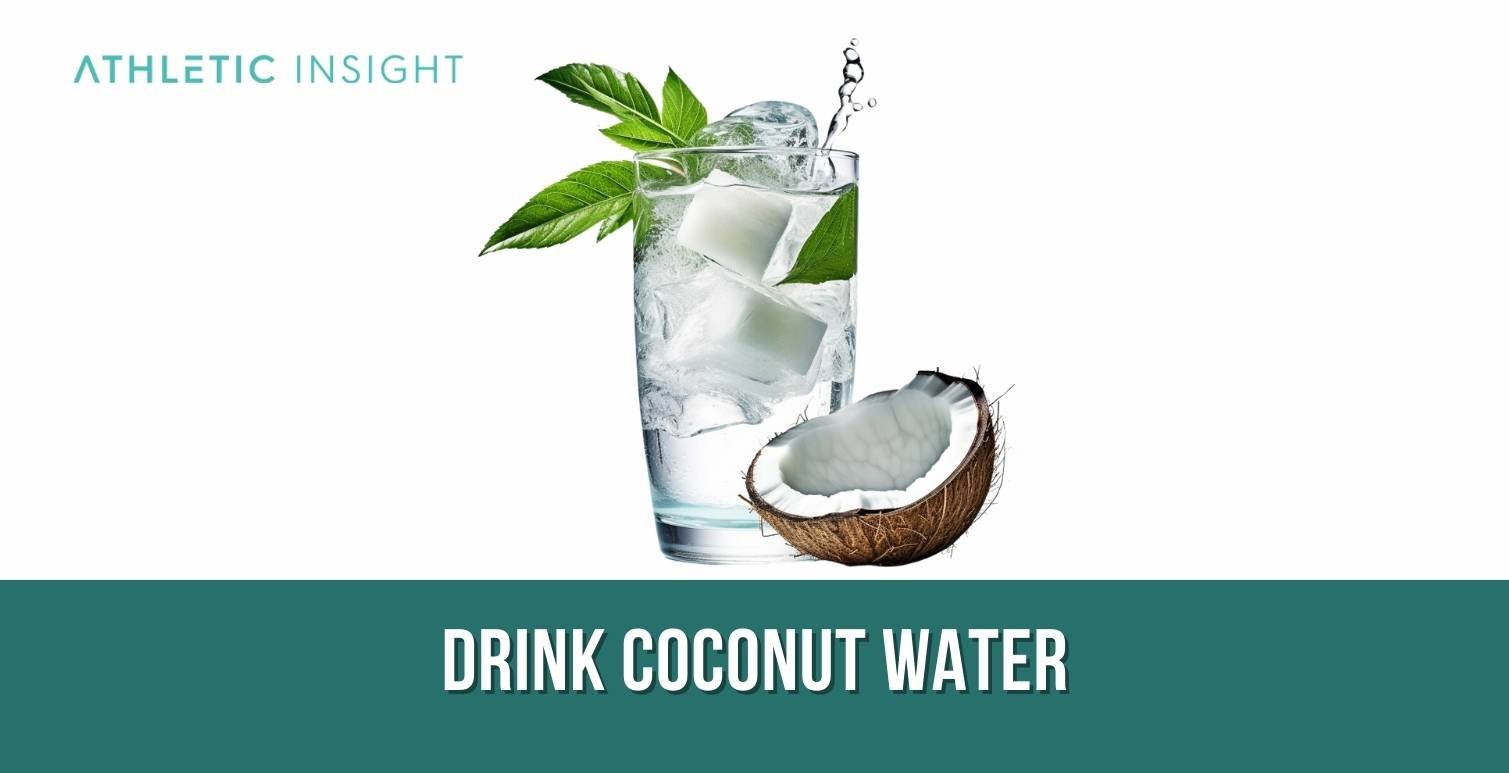In the realm of personal health and wellness, the best ways to stay hydrated takes center stage. After all, hydration is the sine qua non of a thriving organism, a vital element that underpins all facets of human health. This article delineates twelve efficacious strategies to maintain optimal hydration levels, making it indispensable for those seeking to enhance their well-being through the meticulous regulation of body fluid levels.
- Drink Enough Water
- Eat Water-Rich Foods
- Avoid Sugary and Alcoholic Beverages
- Drink Coconut Water
- Use a Hydration App
- Carry a Water Bottle
- Drink Herbal Tea
- Set Reminders
- Monitor Urine Color
- Avoid Caffeine
- Recognize Dehydration Signs
- Hydrate in The Morning and Before Meals
1. Drink Enough Water
Water serves as the principal component of the body, forming the basis of blood, digestive juices, urine, and perspiration, and is contained in lean muscle, fat, and bones. Consumption of ample water is a straightforward yet cardinal way to stay hydrated. It aids in the proper functioning of the body’s cells, the regulation of body temperature, and the prevention of infections. Studies have consistently found that daily consumption of adequate amounts of water leads to improved mood, memory, and cognitive function, hence it’s an effective method to maintain hydration.
2. Eat Water-Rich Foods
In addition to beverages, foods — particularly fruits and vegetables — can significantly contribute to daily water intake. Water-rich foods such as cucumbers, oranges, watermelon, and strawberries contain substantial amounts of water and can assist in maintaining optimal hydration levels. They operate by gradually releasing water into your system as your body digests the food. Consuming these foods not only augments hydration levels but also supplies vital nutrients to the body. It is, therefore, a highly effective and dual-pronged approach to staying hydrated.
3. Avoid Sugary and Alcoholic Beverages
Sugar-laden and alcoholic beverages, despite their water content, can act as diuretics, causing the body to lose more fluids through increased urination. This phenomenon is known as a diuretic effect. When a person consumes these beverages, their kidneys start expelling water, leading to dehydration if the loss is not compensated with water intake. Limiting the consumption of such beverages is a proactive measure for maintaining ideal hydration levels.
4. Drink Coconut Water
Coconut water serves as a natural, healthy, and low-calorie alternative to sports drinks, laden with electrolytes and essential minerals. The presence of these essential components enhances the body’s capacity to absorb water, making coconut water a potent hydration option. Various studies indicate that coconut water is just as effective for rehydration after physical exertion as traditional sports drinks.

5. Use a Hydration App
In the digital age, an array of applications exist to track water intake and remind users to hydrate. These applications function by prompting notifications or reminders to drink water based on individualized water intake goals. Given the convenience and customization provided by these applications, they serve as a highly efficacious tool for maintaining hydration levels.
6. Carry a Water Bottle
Possessing a water bottle can significantly improve water intake as it provides continuous access to water. With water readily available, individuals are more likely to drink during the day. Hence, using a water bottle is a simple yet effectual method to stay hydrated, especially when on the move.
7. Drink Herbal Tea
Herbal teas, devoid of caffeine, offer a hydrating and potentially health-enhancing alternative to water. Their benefits extend beyond hydration to include a plethora of antioxidants and other phytochemicals beneficial to health. The act of drinking herbal tea contributes to fluid intake, aiding in maintaining hydration.
8. Set Reminders
Setting reminders to drink water can be immensely beneficial for those with busy schedules or those who forget to hydrate. By leveraging technological tools like smartphone alarms, hydration can be integrated seamlessly into one’s daily routine. This method can be particularly effective as it instills a regular hydration habit.
9. Monitor Urine Color
The color of urine can provide a fairly accurate reflection of the body’s hydration status. When adequately hydrated, urine typically has a pale yellow color. Dark yellow or amber-colored urine often indicates dehydration. Thus, monitoring urine color can be a helpful, practical guide to ensuring sufficient hydration levels are maintained.
10. Avoid Caffeine
Caffeine, a mild diuretic, can promote fluid loss, leading to decreased hydration levels. While moderate consumption doesn’t pose a risk for dehydration, high levels of caffeine intake can lead to increased urination and fluid loss. As a result, reducing caffeine consumption, particularly in high-caffeine beverages like coffee and energy drinks, can serve as an effective strategy for maintaining proper hydration.
11. Recognize Dehydration Signs
Awareness of the symptoms of dehydration can be instrumental in maintaining proper hydration. Early signs of dehydration include thirst, darker urine, and decreased urine production. More severe dehydration might cause dry skin, dizziness, and fatigue. Understanding these symptoms allows one to address dehydration promptly and effectively, contributing to better overall hydration management.

12. Hydrate in The Morning and Before Meals
Drinking water in the morning after waking up helps kick-start the body’s systems and rehydrate the body after overnight water loss. Additionally, drinking water before meals can aid in digestion while also providing a sense of fullness, which can help control calorie intake. This strategy contributes to overall hydration status while providing additional health benefits.
Why is Hydration important?
Hydration, defined as the process of absorbing water, is a vital process for the human body’s function and survival. Water serves as the primary component of every cell in the body and plays an indispensable role in every bodily function. It aids in digestion, absorption, circulation, creation of saliva, transportation of nutrients, and maintenance of body temperature.
Dehydration, or the lack of adequate water in the body, can lead to serious health issues such as kidney stones, heat stroke, and seizures. For that reason, hydration is critical for the prevention of major health risks.
How much water is needed every day?
While the popular recommendation is to drink eight glasses (approximately 2 liters) of water per day, actual needs can vary based on factors like age, sex, weight, physical activity levels, and overall health. The National Academies of Sciences, Engineering, and Medicine suggests a daily water intake of about 3.7 liters (or about 13 cups) for men and 2.7 liters (or about 9 cups) for women. This includes all beverages and water-rich foods.
Does an Athlete need more water than a normal person?
Yes, athletes usually require more water than non-athletes due to increased perspiration during physical activities. Strenuous exercises result in increased sweat loss leading to higher hydration requirements. The American College of Sports Medicine suggests that athletes should drink approximately 500ml of fluids 2 hours before exercise and continue to replenish during and after the exercise to replace water lost in sweat.

Does Hydration improve Sports Performance?
Yes, hydration has a significant impact on sports performance. Dehydration can reduce strength, speed, stamina, and can lead to poor cognitive function. Studies show that losing even 2% of one’s body weight in fluids can decrease performance by up to 25%. Therefore, maintaining optimal hydration is crucial for athletes to perform at their best.
Does Diet affect Hydration?
Yes, diet significantly impacts hydration levels. Foods rich in water content, like fruits and vegetables, can contribute to daily water intake. Conversely, high intake of salt, sugar, and alcohol can cause the body to expel more water, potentially leading to dehydration. Therefore, it is crucial to consider dietary choices when striving to maintain optimal hydration.



